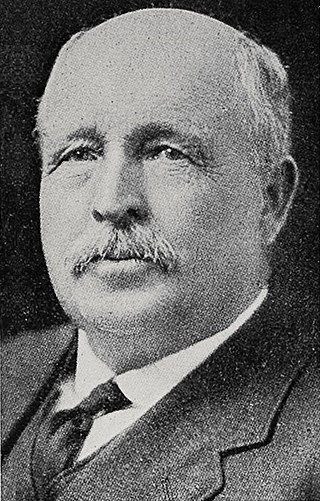Related Research Articles

The 1899 New Zealand general election was held on 6 and 19 December in the European and Māori electorates, respectively, to elect 74 MPs to the 14th session of the New Zealand Parliament. The election was again won by the Liberal Party, and Richard Seddon remained Prime Minister.

The 1911 New Zealand general election was held on Thursday, 7 and 14 December in the general electorates, and on Tuesday, 19 December in the Māori electorates to elect a total of 80 MPs to the 18th session of the New Zealand Parliament. A total number of 590,042 (83.5%) voters turned out to vote. In two seats there was only one candidate.

The 1919 New Zealand general election was held on Tuesday, 16 December in the Māori electorates and on Wednesday, 17 December in the general electorates to elect a total of 80 MPs to the 20th session of the New Zealand Parliament. A total number of 560,673 (80.5%) voters turned out to vote.
Otago was a New Zealand parliamentary electorate first created for the 1978 election, which was replaced by the Waitaki electorate and Clutha-Southland electorates for the 2008 election. Its last representative was Jacqui Dean of the National Party.

Waitaki is an electorate for the New Zealand House of Representatives that crosses the boundary of North Otago and South Canterbury towns on the East Coast of the South Island. The electorate was first established for the 1871 election that determined the 5th New Zealand Parliament. It has been abolished and re-established several times and in its early years was a two-member electorate for two parliamentary terms. The current electorate has existed since the 2008 election and is held by Miles Anderson of the National Party.
Wallace was a New Zealand parliamentary electorate. It was established in 1858, the first election held in 1859, and existed until 1996. From 1861 to 66, it was represented by two members. In total, there were 18 Members of Parliament from the Wallace electorate.
Hutt was a New Zealand parliamentary electorate. It was one of the original electorates in 1853 and existed during two periods until 1978. It was represented by 13 Members of Parliament.
Bruce was a rural parliamentary electorate in the Otago region of New Zealand, from 1861 to 1922. For part of the 1860s with the influx to Otago of gold-miners it was a multi-member constituency with two members.
Chalmers, originally Port Chalmers, was a parliamentary electorate in the Otago Region of New Zealand, from 1866 to 1938 with a break from 1896 to 1902. It was named after the town of Port Chalmers, the main port of Dunedin and Otago.
Caversham was a parliamentary electorate in the city of Dunedin in the Otago region of New Zealand, from 1866 to 1908.
Mornington is a former parliamentary electorate from 1946 to 1963, centred on the suburb of Mornington in the city of Dunedin, New Zealand.
Taieri is a parliamentary electorate in the Otago region of New Zealand, initially from 1866 to 1911, and was later recreated during the 2019/20 electoral redistribution ahead of the 2020 election.

John Edie was a Liberal Party Member of Parliament in the Otago region of New Zealand. He was a surveyor and an engineer, and also spent time as a farmer. He was Mayor of Lawrence.
James William Thomson was a 19th-century conservative Member of Parliament in New Zealand.
Dunedin Country was a parliamentary electorate in the rural area surrounding the city of Dunedin in Otago, New Zealand, from 1853 to 1860. It was a two-member electorate and was represented by a total of five members of parliament.
Westland was a parliamentary electorate in the West Coast of New Zealand from 1866 to 1868 and 1890 to 1972. In 1972 the Tasman and West Coast electorates replaced the former Buller and Westland electorates.
Otago Central or Central Otago was a parliamentary electorate in the Otago region of New Zealand, from 1911 to 1919 as Otago Central; from 1928 to 1957 as Central Otago; and from 1957 to 1978 as Otago Central. It was replaced by the Otago electorate. The electorate was represented by six Members of Parliament.
City of Dunedin, during the first two parliaments called Town of Dunedin, was a parliamentary electorate in Dunedin in Otago, New Zealand. It was one of the original electorates created in 1853 and existed, with two breaks, until 1905. The first break, from 1862 to 1866, was caused by an influx of people through the Otago gold rush, when many new electorates were formed in Otago. The second break occurred from 1881 to 1890. It was the only New Zealand electorate that was created as a single-member, two-member and three member electorate.
Alexander Scott Malcolm was an independent conservative and then Reform Party Member of Parliament and advocate of prohibition in New Zealand.
The Bruce by-election 1862 was a by-election held in the multi-member Bruce electorate during the 3rd New Zealand Parliament, on 31 July 1862. The by-election was caused by the death of incumbent MP Charles Kettle on 5 June, and was won by Edward Cargill.
References
- McRobie, Alan (1989). Electoral Atlas of New Zealand. Wellington: GP Books. ISBN 0-477-01384-8.
- Norton, Clifford (1988). New Zealand Parliamentary Election Results 1946-1987: Occasional Publications No 1, Department of Political Science. Wellington: Victoria University of Wellington. ISBN 0-475-11200-8.
- Wilson, James Oakley (1985) [First published in 1913]. New Zealand Parliamentary Record, 1840–1984 (4th ed.). Wellington: V.R. Ward, Govt. Printer. OCLC 154283103.